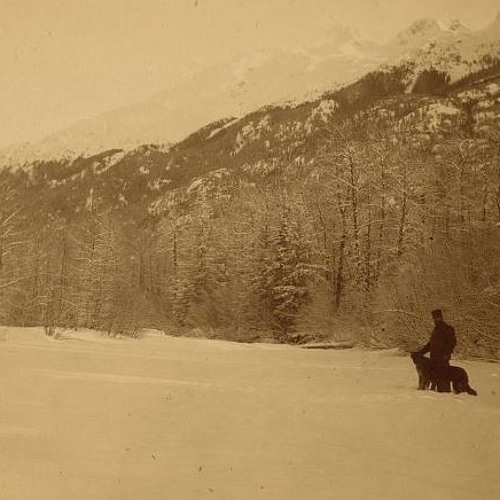He was angry and cursed his luck aloud. He had hoped to get into camp with the boys at six o’clock, and this would delay him an hour. Now he would have to build a fire and dry his moccasins and socks. This was most important at that low temperature. He knew that much.So he turned aside to the bank, which he climbed. On top, under several small pine trees, he found some firewood which had been carried there by the high water of last year. There were some sticks, but also larger branches, and some dry grasses. He threw several large branches on top of the snow. This served for a foundation and prevented the young flame from dying in the wet snow. He made a flame by touching a match to a small piece of tree bark that he took from his pocket. This burned even better than paper. Placing it on the foundation, he fed the young flame with pieces of dry grass and with the smallest dry sticks.He worked slowly and carefully, realizing his danger. Gradually, as the flame grew stronger, he increased the size of the sticks with which he fed it. He sat in the snow, pulling the sticks from the bushes under the trees and feeding them directly to the flame. He knew he must not fail. When it is 75 below zero, a man must not fail in his first attempt to build a fire. This is especially true if his feet are wet. If his feet are dry, and he fails, he can run along the trail for half a mile to keep his blood moving. But the blood in wet and freezing feet cannot be kept moving by running when it is 75 degrees below. No matter how fast he runs, the wet feet will freeze even harder.All this the man knew. The old man on Sulphur Creek had told him about it, and now he was grateful for the advice. Already all feeling had gone from his feet. To build the fire he had been forced to remove his mittens, and the fingers had quickly become numb. His pace of four miles an hour had kept his heart pushing the blood to all parts of his body. But the instant he stopped, the action of the heart slowed down. He now received the full force of the cold. The blood of his body drew back from it. The blood was alive, like the dog. Like the dog, it wanted to hide and seek cover, away from the fearful cold. As long as he walked four miles an hour, the blood rose to the surface. But now it sank down into the lowest depths of his body. His feet and hands were the first to feel its absence. His wet feet froze first. His bare fingers were numb, although they had not yet begun to freeze. Nose and face were already freezing, while the skin of all his body became cold as it lost its blood.
Orson Welles narrates the 1969 adaptation ...

No comments:
Post a Comment